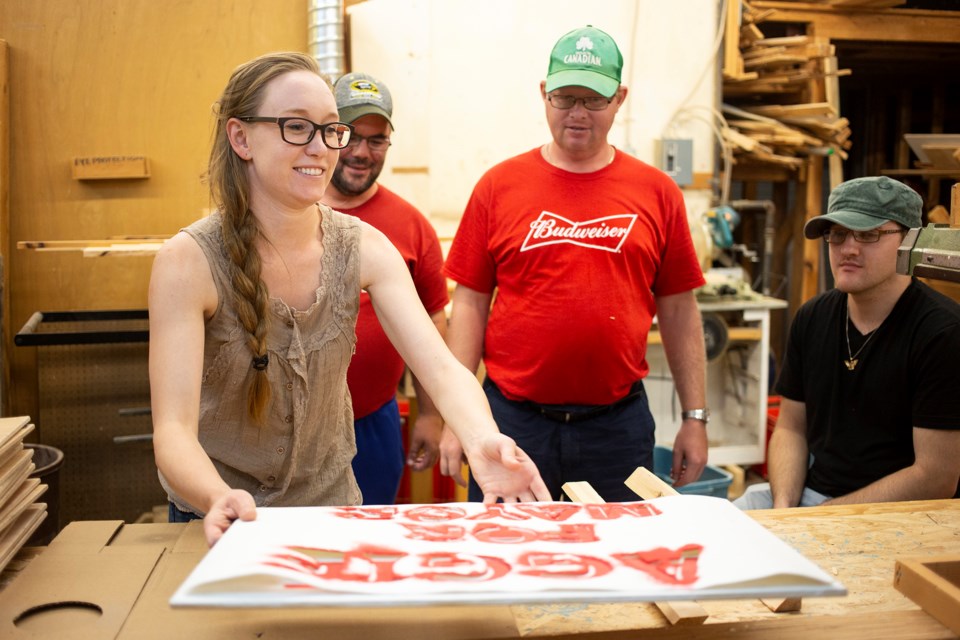Guelph mayoral candidate Aggie Mlynarz is hoping to open a number of conversations by shying away from plastic election signs and partnering with people with disabilities to build and install wooden ones.
On Tuesday, Mlynarz met four of the people who will be painting her new campaign signs at Torchlight Services on Edinburgh Road.
When the previous Liberal provincial government raised the minimum wage to $14 an hour in 2017, it also ended support for sheltered workshops, in which not-for-profits like Torchlight could hire out people with disabilities to work at rate of pay below minimum wage.
Mlynarz said that change was difficult for some of the people who use Torchlight’s services because they wanted to continue working.
“They were deeply impacted because such a change had happened and those contracts were gone. We wanted to engage with them in a meaningful way, which was by working through this project,” said Mlynarz.
When the sheltered workshops were active, the Torchlight Services wood shop made wood stakes for planting trees or for marking areas in construction.
Because the sheltered workshops have been discontinued, Mlynarz said the people making the signs are volunteering their time, but noted she will be making a donation to Torchlight Services for the hours they are putting in at a symbolic $15 an hour.
Instead of being paid for the work they were doing, participants in the Torchlight Services programming now have to pay about $10 a day to attend, said Mlynarz. She hopes the donation from her campaign will go toward alleviating that cost to participants, at least for a time.
“If we can help them not have to do that anymore, that is something that we would be happy to have engaged positively with them,” said Mlynarz. “We want them to be able to participate in a way that is meaningful to get individuals who want to work in the wood shop to be able to work in the wood shop again.”
The Canadian spruce plywood signs cost about $10 each for materials, which is in the range of plastic signs, which run from about $5 to $20 each, depending on the size. The paint being used is a water-based acrylic.
Mlynarz said a number of her supporters have also been making their own signs in support of her campaign.
"We have been really excited to see how people have been upcycling and using their own paints and stuff at home to make their own homemade signs," said Mlynarz.
For now, the four people at Torchlight who are volunteering their time for the project will be building 20 of the signs. Mlynarz will put in another order if there is demand, she said.
Mlynarz said the signs should start appearing on front lawns by the end of the week.
“We will work at the pace this organization wants to work at and try to get as many signs as we can, without exhausting anyone or using the facility as a factory production,” she said. “I don’t really have an interest in putting them out on boulevards and along the roadways because I think it would be something that would be taken or vandalized, just because it is different.”
Jeremy Fyfe, age 24, is one of the volunteers building the signs. He said he will be proud to see them on front lawns after they are built.
“I’m concerned people are going to wreck these and just leave them on the side of the street,” said Fyfe.
Torchlight Services management declined an opportunity to comment for this story.
Mlynarz made the decision not to have plastic election signs made up due to concerns they can’t be recycled.
In a tweet earlier this month, her opponent Cam Guthrie said the signs can be recycled here in Guelph and noted he reused his from the 2014 election.
Mlynarz, who worked at the city’s Waste Resource Innovation Centre during the summer of 2015, said Coroplast signs may be taken in at the depot, but they may end up being treated as waste.
“Every time you pick up a piece of plastic, it has a number on it. The Coroplast signs don’t have a number on them. For that reason, if they have going down the line they have been treated as debris because they don’t have a number,” said Mlynarz.
Guthrie declined comment.
“There’s just a difference between me and Cam here. I have been there, I have worked there, I have seen it. He just has a different perspective on it,” she said.
